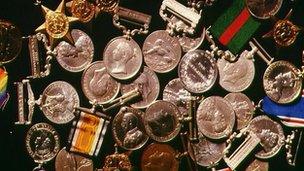Military medals system 'needs rapid re-think'
- Published

Medals form a strong part of UK military tradition
The UK's military medals system needs a "rapid but in-depth" re-think, a report for the government recommends.
Veterans, including those who protected Arctic convoys in World War II and those who served in later Cold War, have called for greater recognition.
In his report, former ambassador Sir John Holmes says there should not be a "blanket refusal" to reconsider cases.
And calls to create a service medal for all military staff were "worthy of consideration", he added.
Sir John, former UK ambassador to France and Portugal, was asked by the prime minister in April to look at the effectiveness and fairness of the current system.
His report says there is "no appetite or good reason to change the basic approach underlying British military campaign medals policy", which is that they "should be awarded sparingly, on the basis of genuine risk and rigour".
'Strong case'
However, Sir John adds that there is "room for greater transparency and flexibility in how some of the current rules are framed and applied and for a broader-based decision-making and review process".
Several campaign groups are calling for new medals to be created.
Among them, Veterans of the Arctic Convoys to Russia from 1942-1944 want a Star for the Arctic to be awarded - similar to the recognition given to personnel in Italy and Africa - on the basis that this comprised a distinct and dangerous theatre of war in its own right.
Servicemen who took part in British nuclear tests in the Pacific during the 1950s and 1960s have also urged the creation of a separate medal.
Many who took part in the Cold War have argued that it was a genuine, high-risk conflict, rather than a "phoney" conflict.
Sir John's report says: "The review, while not able to take a definitive view in any particular case and anxious to avoid raising public expectations by naming names, was sufficiently impressed by the arguments of some of the campaigners about past decisions to recommend that there should now be a rapid but in-depth, independent look at the main controversies, to try to draw a line under them."
It also finds a "strong case" for a separate medal for people working in campaign support.
'Consensus'
Sir John adds that the current cut-off point for awarding medals - five years after the operations have ended - should stay in place. But this should not mean a "blanket refusal to reconsider cases" whatever the circumstances.
The report recommends that the membership of the Committee on the Grant of Honours, Decorations and Medals should be broadened to reflect outside views, expertise and interests.
In recent years, some groups have campaigned for a National Defence Medal, separate to those awarded for specific campaigns.
Sir John says this is "worthy of consideration", but notes that it is "a decision of broad national significance which would require a broad political and public consensus".
The estimated cost of such a scheme is more than £300m.
Some groups have suggested that veterans could pay towards the costs of medals at a time of tight government finances. Sir John rules this out but says the Ministry of Defence's administrative and other costs should be "minimised where possible through recourse to different kinds of volunteer funding".
A second report, looking at the implementation of the proposals for reform, is expected to be published in the autumn.